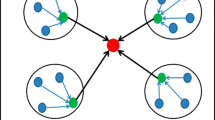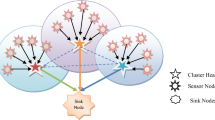Abstract
Recent advancements in sensing and networking technology, such as the Internet of Things (IoT), provide a low-cost monitoring system that serves as the backbone of the smart city. In recent years, various real-time applications have developed to monitor and control physical objects using smart sensors. The use of smart sensors generates a massive amount of data in terms of text, numeric, image and video formats, etc. In IoT, transmitting an enormous amount of data consume more energy. So, clustering is the right option for collecting and exchanging data over the network. Many researchers have used the optimization algorithms to choose cluster head (CH) in the cluster. During the CH rotation, many of the optimization algorithms take more time to converge. To address this problem, this paper proposes a new caledonian crow learning algorithm (NCCLA) to identify the appropriate CH in the cluster. Generally, it has two processes, namely cluster formation and CH selection. The Euclidean distance is used to create a cluster within the network. The NCCLA algorithm is proposed to find the best CH on the cluster. Simulation is conducted on MATLAB R2019a. The efficacy of the proposed NCCLA algorithm is compared to the fuzzy clustering particle swarm optimization (FCPSO) and the Improved Fruit Fly Optimization Algorithm (IFFOA). The performance of NCCLA increases the network lifespan by 10% and increases the data packet delivery by 10%.






Similar content being viewed by others
Explore related subjects
Discover the latest articles, news and stories from top researchers in related subjects.References
Al-Qarni BH, Almogren A, Hassan MM (2019) An efficient networking protocol for internet of things to handle multimedia big data. Multimed Tools Appl 78(21):30039–30056
Al-Sorori W, Mohsen AM (2020) New caledonian crow learning algorithm: a new metaheuristic algorithm for solving continuous optimization problems. Appl Soft Comput 92:106325
Al-Turjman F (2019) Cognitive routing protocol for disaster-inspired internet of things. Futur Gener Comput Syst 92:1103–1115
Behera TM, Samal UC, Mohapatra SK (2018) Energy-efficient modified leach protocol for iot application. IET Wireless Sensor Syst 8(5):223–228
Grewal A, Kaur M, Park JH (2019) A unified framework for behaviour monitoring and abnormality detection for smart home. Wirel Commun Mob Comput 2019:106325. https://doi.org/10.1155/2019/1734615
Hellaoui H, Koudil M, Bouabdallah A (2020) Energy efficiency in security of 5g-based iot: an end-to-end adaptive approach. IEEE Internet Things J 7(7):6589–6602
Hu W, Yao W, Hu Y, Li H (2019) Selection of cluster heads for wireless sensor network in ubiquitous power internet of things. Int J Comput Commun Control 14(3):344–358
Iwendi C, Maddikunta PKR, Gadekallu TR, Lakshmanna K, Bashir AK, Piran MJ (2020) A metaheuristic optimization approach for energy efficiency in the iot networks. Practice and Experience, Software
Jesudurai SA, Senthilkumar A (2019) An improved energy efficient cluster head selection protocol using the double cluster heads and data fusion methods for iot applications. Cogn Syst Res 57:101–106
Lao L, Li Z, Hou S, Xiao B, Guo S, Yang Y (2020) A survey of iot applications in blockchain systems: Architecture, consensus, and traffic modeling. ACM Comput Surveys (CSUR) 53(1):1–32
Liu L, Shi Q, Lee C (2020) A novel hybridized blue energy harvester aiming at all-weather iot applications. Nano Energy 76:105052
Malakar M et al (2020) Tlbo based cluster-head selection for multi-objective optimization in wireless sensor networks. Nature Inspired Computing for Wireless Sensor Networks. Springer, Berlin, pp 303–319
Metallidou CK, Psannis KE, Egyptiadou EA (2020) Energy efficiency in smart buildings: Iot approaches. IEEE Access 8:63679–63699
Panchal A, Singh RK (2021) Eadcr: energy aware distance based cluster head selection and routing protocol for wireless sensor networks. J Cir Syst Comput 30(04):2150063
Poluru RK, Kumar RL (2019) An improved fruit fly optimization (iffoa) based cluster head selection algorithm for internet of things. Int J Comput Appl 43:623
Poluru RK, Ramasamy LK (2020) Optimal cluster head selection using modified rider assisted clustering for iot. IET Commun 14(13):2189–2201
Preeth SSL, Dhanalakshmi R, Kumar R, Shakeel PM (2018) An adaptive fuzzy rule based energy efficient clustering and immune-inspired routing protocol for wsn-assisted iot system. J Ambient Intell Hum Comput 17:1–13
Qiu T, Liu X, Feng L, Zhou Y, Zheng K (2016) An efficient tree-based self-organizing protocol for internet of things. Ieee Access 4:3535–3546
Rani S, Ahmed SH, Rastogi R (2019) Dynamic clustering approach based on wireless sensor networks genetic algorithm for iot applications. Wirel Netw 26:2307
Ravi G, Kashwan K (2015) A new routing protocol for energy efficient mobile applications for ad hoc networks. Comput Electr Eng 48:77–85
Ray A, De D (2016) Energy efficient clustering protocol based on k-means (eecpk-means)-midpoint algorithm for enhanced network lifetime in wireless sensor network. IET Wirel Sensor Syst 6(6):181–191
Sankar S, Srinivasan P, Luhach AK, Somula R, Chilamkurti N (2020) Energy-aware grid-based data aggregation scheme in routing protocol for agricultural internet of things. Sustain Comput Inform Syst 28:100422
Sankar S, Somula R, Kumar RL, Srinivasan P, Jayanthi MA (2021) Trust-aware routing framework for internet of things. Int J Knowl Syst Sci (IJKSS) 12(1):48–59
Sennan S, Balasubramaniyam S, Luhach AK, Ramasubbareddy S, Chilamkurti N, Nam Y (2019) Energy and delay aware data aggregation in routing protocol for internet of things. Sensors 19(24):5486
Sennan S, Ramasubbareddy S, Balasubramaniyam S, Nayyar A, Abouhawwash M, Hikal NA (2021) T2fl-pso: Type-2 fuzzy logic-based particle swarm optimization algorithm used to maximize the lifetime of internet of things. IEEE Access 9:63966–63979
Sharma PK, Kumar N, Park JH (2020) Blockchain technology toward green iot: opportunities and challenges. IEEE Netw 34(4):263–269
Shende DK, Sonavane S (2020) Crowwhale-etr: crowwhale optimization algorithm for energy and trust aware multicast routing in wsn for iot applications. Wirel Netw 26:4011
Shyjith M, Maheswaran C, Reshma V (2021) Optimized and dynamic selection of cluster head using energy efficient routing protocol in wsn. Wirel Pers Commun 116(1):577–599
Sindhuja M, Selvamani K (2019) Cluster head selection framework for risk awareness enabled iot networks using ant lion optimisation approach. Wirel Pers Commun 107(1):1–21
Zamil MGA, Samarah S, Rawashdeh M, Karime A, Hossain MS (2019) Multimedia-oriented action recognition in smart city-based iot using multilayer perceptron. Multimed Tools Appl 78(21):30315–30329
Acknowledgements
Research Supporting Project number(RSP-2021/250), King Saud University, Riyadh, Saudi Arabia
Author information
Authors and Affiliations
Corresponding author
Additional information
Publisher's Note
Springer Nature remains neutral with regard to jurisdictional claims in published maps and institutional affiliations.
Rights and permissions
About this article
Cite this article
Sankar, S., Ramasubbareddy, S., Luhach, A.K. et al. NCCLA: new caledonian crow learning algorithm based cluster head selection for Internet of Things in smart cities. J Ambient Intell Human Comput 13, 4651–4661 (2022). https://doi.org/10.1007/s12652-021-03503-3
Received:
Accepted:
Published:
Issue Date:
DOI: https://doi.org/10.1007/s12652-021-03503-3




